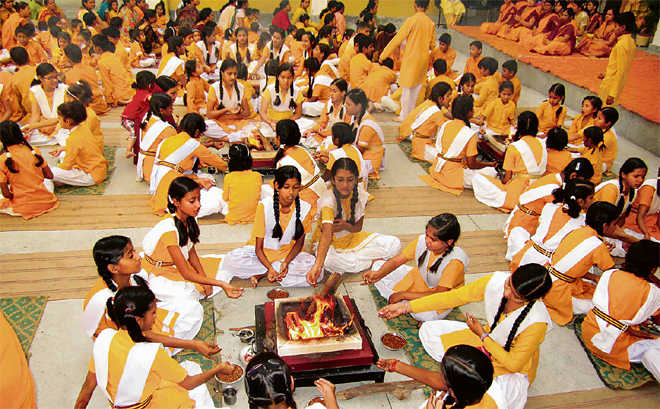A little less Indian
Yogendra Yadav
FOR the last four years, we have had a dialogue of the deaf on the issue of Indianisation of education. Every now and then, someone in the government makes a half-baked, idiotic or pernicious proposal in the name of Indianisation. The idea is ridiculed by academics, intellectuals and opinion makers. The government makes some cosmetic changes and forgets about it. The critics also forget about it. There is no meaningful conversation about it.
A brief encounter with an educated Indian is enough to understand why Indianisation of education needs serious debate. A graduate from any of our best universities cannot read and write in any Indian language. He has little idea of the vast reservoir of modern literature in our bhashas. If you ask any leading intellectual when was the last time they read a book or wrote an article in any Indian language other than English, the answer would be embarrassing. Some of the leading centres of Sanskrit are now located outside India.
It’s not just language. A modern, educated Indian knows little about our mythology. A trained allopathic medical doctor thinks that ayurveda and Unani are nothing but mumbo-jumbo. A textile engineer knows nothing about our great traditions of weaving and dyeing. The syllabus of our best institutions and universities is usually a poor copy of what was taught in Europe or America a few years ago. Lacking in cultural self-confidence and desperate for external recognition, they fall prey to any Western praise of anything Indian. Our education system is producing culturally illiterate Indians, alien in their own land.
So, the real debate is not whether we need Indianisation of education or not. The real debate should be how do we go about Indianising our education system.
The trouble is that those who talk the loudest about Indianisation of education are least qualified to talk either about education or about Indian culture. They are illiterate in pedagogy and superficially informed about our cultural and intellectual traditions. They are a model of how not to Indianise education. Obviously, Indianisation of our education system cannot mean that we glorify everything that is Indian. It must not mean focusing exclusively on one strand in our traditions, usually the high textual and Brahmanic tradition. It cannot mean closing ourselves to knowledge from all over the world. And, it cannot mean following the method of memory-based learning that was privileged in our traditions.
A serious agenda of Indianisation of education would involve, first of all, paying serious attention to our bhashas. English may well be an Indian language by now, and no child should be deprived of opportunities of global exposure that English brings with it. This, however, is no justification for continuing with the abominable and unscientific practice of English-medium instruction for our children. The pedagogically sound principle of education in mother tongue and learning of multiple languages proposed by the three-language formula should be restored. Besides, teaching and learning of classical languages like Tamil, Sanskrit and Persian should be a national priority. We need nothing short of a national mission for translating modern, scientific knowledge into our bhashas. We must ensure that every educated Indian should be fluent in reading and writing in, at least, one of our bhashas.
Indianisation of education must also mean greater familiarity with an ability to draw up on Indian intellectual traditions. Every Indian student must learn something about our classics from all regions and religions. They must also learn modern Indian thought of the last two centuries that has constituted the Indian Republic. Besides this, each branch of knowledge must make its business to focus on what we can draw upon from our textual or oral traditions. This would mean going beyond classroom teaching and learning from knowledge communities. Engineers would need to sit with potters, sculptors, well-diggers, pond builders and weavers. The doctors would need to learn from traditional healers and from medicinal plant collectors. Agricultural scientists would need to learn from indigenous seed collectors and desi innovators.
Above all, Indianisation of education would mean placing the Indian context at the heart of the knowledge enterprise. In the last instance, what matters is not the language and the resources we use for our answers. What matters is which questions do we ask. Or more precisely, “whose” questions do we ask. The biggest problem in our knowledge enterprise today is that our smartest minds spend their lives answering someone else’s questions responding to someone else’s needs. Reversing that would be at the heart of the challenge of Indianisation of education.
This would entail a radical shift in the agenda of research, teaching and learning. Cutting-edge research in medicine, agriculture, engineering or IT will be defined by how well it responds to the needs of an ordinary Indian, given the natural and economic resources that we possess at this moment. Research in social science and humanities would need to begin with “here and now” and make sense of our unique historic trajectory, rather than take the accidental path of Europe and America as the norm that we must approximate. Our universities must respond to our diseases, our difficulties, our problems and must work out a solution that keeps in mind our constraints. Excellence in education will not be judged by how it is rated by external agencies, but by how well it responds to our societal needs and conditions of our people by how well its concepts and categories help us understand our own practices.
This plea might disturb many modern, well-educated Indians. But we must remember that modernity is not about copying someone else. True modernity is about working out bold and new solutions to one’s own predicament. Quest for universality does not begin with abstractions. Not everyone might agree with this. But can we, at least, begin a serious debate on Indianisation of education?
yogendra.yadav@gmail.com









